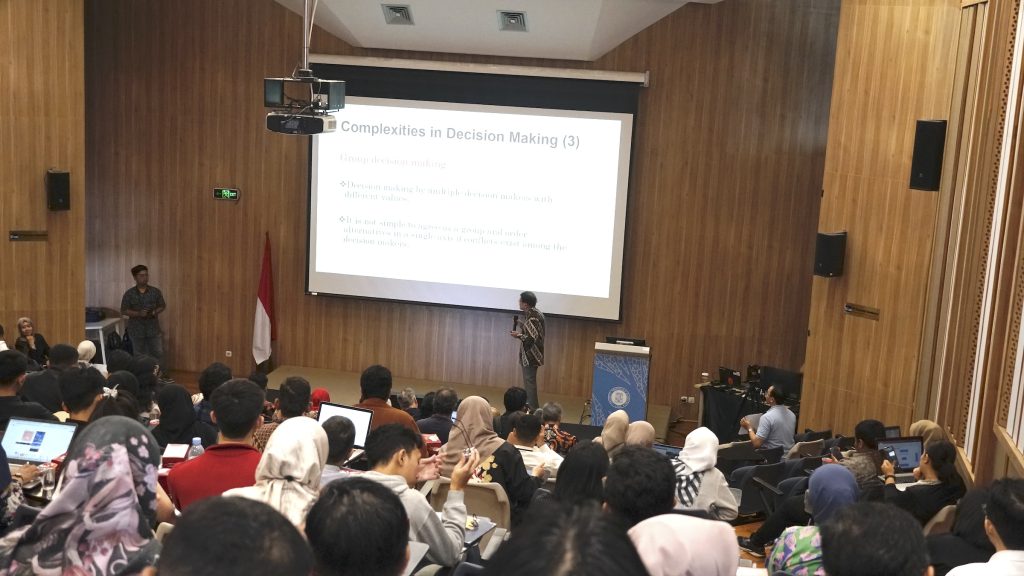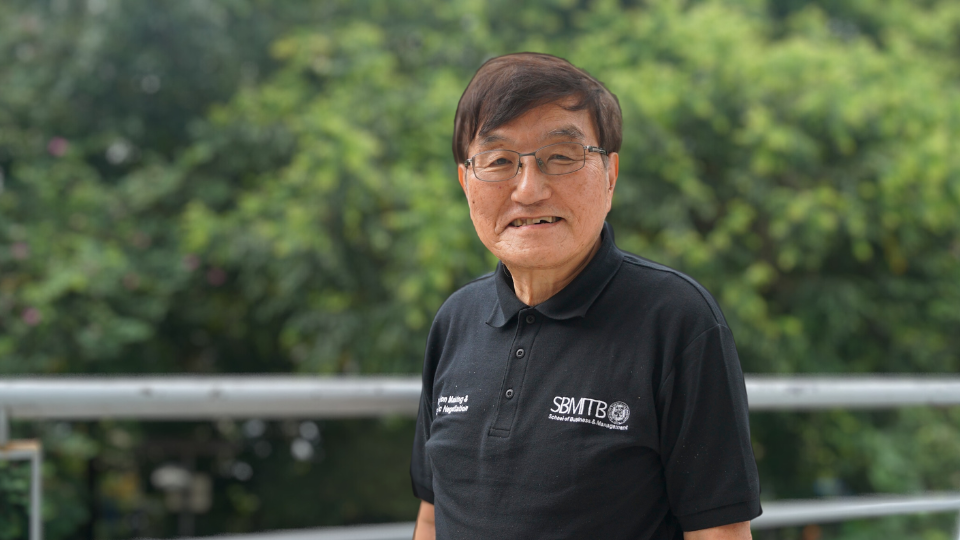SBM ITB was only three years old when it welcomed a new visiting professor from the Tokyo Institute of Technology (Tokyo Tech), Japan. Professor Kyoichi Kijima, a valued expert in systems sciences, has dedicated an impressive 18 years to introducing systems thinking concepts to business management at SBM ITB. During his visit this year, Prof. Kijima shared his experiences at SBM ITB, his use of his engineering background to teach business courses, and his involvement with the research group in system sciences—the Systems Mafia
Professor Kijima’s History with ITB
Prof. Kijima’s relationship with ITB predates the establishment of SBM ITB. Given the strong connection between ITB and Tokyo Tech, this relationship initially brought Prof. Kijima to ITB. When SBM was introduced as a new department, ITB was already familiar territory for him.
Prof. Kijima found SBM ITB particularly interesting due to its similarity to VALDES—the Department of Value and Decision Science—at Tokyo Tech, a newly established department. SBM and VALDES integrate social sciences, business, and human sciences with technology management, promoting an interdisciplinary approach to business and management without limiting the scope to science and technology.
Among the special interest groups at SBM, Prof. Kijima is particularly drawn to the Decision Making and Strategic Negotiation Interest Group, led by Prof. Dr. Ir. Utomo Sarjono Putro, M.Eng. This group’s alignment with his research interests strongly motivated Prof. Kijima to collaborate with SBM ITB, joining as a visiting professor in 2006. This year marks his 18th year at SBM.
Combining Business with Engineering Science
Teaching business courses with a strong industrial engineering and systems science background allows Prof. Kijima to offer a unique perspective. The systems concept addresses managerial challenges and applies to everything from the solar system to bacteria. In business, applying systems thinking involves viewing an organization as a system.
Systems thinking draws an analogy between organizations and human beings. “Human beings have a brain, neurons, body parts, all interconnected. For instance, the brain directly influences the movement of the arms. Similarly, we need to view an organization as a viable system,” he explained.
According to Prof. Kijima, managing an organization requires a combination of social and engineering sciences, with systems thinking as the backbone. Systems thinking is fundamental to logical thinking and design thinking and provides the foundation for service science and service-dominant logic.
Teaching at SBM ITB
Prof. Kijima teaches at SBM ITB during both the spring and fall semesters. Each year, he comes in person for a month during the spring semester and conducts online classes during the fall. The only interruption to his visits was during the pandemic, and he expressed his happiness to be back last year.
Prof. Kijima tailors his methods by adjusting his focus when teaching students at different levels. For Master’s students, he emphasizes a solid conceptual understanding of systems thinking to tackle real management problems. For doctorate students, he offers support for their PhD research, providing personal feedback on their presentations based on systems thinking.
Reflecting on his 18 years at SBM, Prof. Kijima expressed his delight at seeing an increasing number of international students each year. He finds it interesting for himself and Indonesian students to exchange opinions with European, Asian, and African peers. Additionally, his interactions with other visiting professors from Portugal and the Netherlands have provided new insights into teaching and research, enriching the cultural exchange for students and faculty.
The Systems Mafia and the Indonesian-Japanese Student Collaboration
Since 2019, SBM ITB has partnered with Shibaura Institute of Technology (SIT) through SIT’s Global Project Based Learning (gPBL) program, a collaboration between students of SBM ITB and SIT. Prof. Kijima voiced his enthusiasm for this collaboration, strengthening relationships between the two universities and positively impacting the Systems Mafia.
The Systems Mafia is a global group of researchers focused on systems thinking. SBM ITB plays a pivotal role in Indonesia. With the SIT leader being a young member of the Systems Mafia, Prof. Kijima is pleased to see the collaboration between the universities grow, enhancing the group’s influence worldwide. “The power of the (Systems) Mafia is increasing and spreading globally,” he stated.
The Future of SBM ITB
“Indonesia is expected to have the 4th largest GDP by 2045. Such economic growth is driven by business; hence, SBM’s role is becoming increasingly significant,” said Prof. Kijima. He is confident that SBM ITB will become a central hub for collaboration within Indonesia and internationally. With SBM’s capabilities and potential, the department is poised to elevate Indonesian businesses to a higher level. He anticipates that SBM faculty will enhance the school’s reputation by diversifying their research from practical to academic, increasing SBM’s visibility in the academic community and contributing globally, thereby growing respect for SBM.







